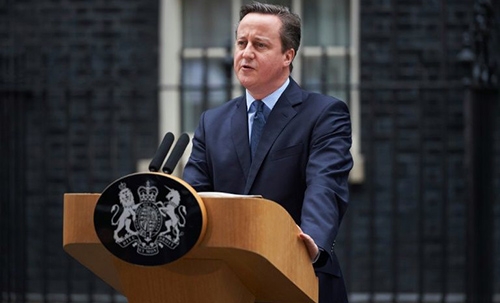Brexit would threaten economic, national security: Cameron
World stocks rallied Monday to extend their recovery after recent turmoil as oil prices gained and despite heightened fears that Britain could quit the European Union rattling the foreign exchange market.
Europe's main indices displayed satisfying gains at closing, with the focus firmly on Britain as sterling plunged to a near seven-year low against the dollar at one point after the latest Brexit twist ahead of a British referendum in June on its EU future.
And in a reminder that all was not well within the eurozone either, data Monday revealed a sharp drop in private sector business activity across the single currency bloc.
Shares on Wall Street also furthered opening gains to join the global equity rally.
"US stocks are trading higher following an advance in Asia and widespread gains in Europe, despite a disappointing eurozone business activity report and softer-than-expected earnings results from HSBC," analysts at Charles Schwab said in a note to investors.
"Stocks are being bolstered by strength in commodity and oil and gas issues, with crude oil prices trading nicely higher and materials stocks recovering.
"The markets are shrugging off heightened currency volatility amid increased uncertainty regarding Britain's future in the EU," it added.
Frankfurt's DAX 30 closed nearly two percent higher, followed by the Paris CAC 40, which was up 1.8 percent, while London's benchmark FTSE 100 index rose by 1.47 percent. Stocks on the Milan exchange meanwhile soared more than 3.5 percent, buoyed by banking shares.
US oil prices rose more than five percent after the International Energy Agency said US shale production could fall by 600,000 barrels a day in 2016, lessening a global glut.
However oil prices will remain low at least until next year, the IEA also warned.
- 'Brexit' fears -
British Prime Minister David Cameron warned that Britain's departure from the EU would threaten its economic and national security as he presented a hard-won deal on EU reforms to parliament.
His speech came a day after London Mayor and Conservative rival Boris Johnson dealt a blow by backing a "Brexit" despite Cameron having appealed for his support.
Analysts saw the "Brexit" discussion rumbling on with sterling likely to remain under pressure.
John Higgins, of Capital Economics, said they forecast sterling falling further against the dollar this year but said that, like in the 2014 Scottish referendum on remaining part of the UK, the exchange rate could rebound if it became clear that British voters would opt to stay in the EU.
"Yet a week is a long time in politics, let alone four months. So now, as then, there is ample opportunity for uncertainty about the result of the referendum to weigh on sterling, especially given the UK's reliance on foreign investors to plug its large current account deficit," he wrote.
The latest developments sent sterling falling heavily against the dollar in early afternoon trading to its lowest level since March 2009 -- $1.4058 -- before recovering slightly. The currency was also under pressure against the euro for much of the trading day.
Global banking giant HSBC Monday reported a shock pre-tax loss in the last quarter of 2015 with results for the year missing analysts' expectations.
Meanwhile in the eurozone, a closely watched survey indicated private sector business activity slowing sharply in February and warned that the economic outlook could weaken even further.
Data monitoring company Markit said the downbeat data showed stagnation in France and slumping demand in powerhouse Germany were adding to already significant deflationary pressures, which can be very damaging to the economy.
Markit said its closely watched Composite Purchasing Managers Index (PMI) fell to 52.7 points in February from 53.6 in January, hitting a 13-month low.
The reading was still above the 50-point boom-or-bust line, showing the 19-nation eurozone economy continued to expand, albeit at a slower pace.
Earlier Monday, Asian stock markets swept higher, with Shanghai leading the charge after news China had replaced its securities regulator.
Photo: digitaljournal.com
Related Posts

